TOGETHER IN ASIA TO LEARN ABOUT THE PAST, TO CELEBRATE THE PRESENT AND TO PEER INTO THE FUTURE, TO RE-MOTIVATE THE CAMILLIAN MISSIONARY SPIRIT
Meeting of the Superior General, the members of the General Consulta and the major Superiors in Taiwan
Loudong, 18-22 June 2018
Second Day – 19 June 2019
The second day of the meeting of the major Superiors of the Order with the Superior General and the members of the General Consulta began today, 19 June 2018, at Loudong (Taiwan).
The day began with a celebration of the Eucharist presided over by Fr. Luigi Galvani, a missionary Camillian religious who was previously in the Philippines and is now in Indonesia (the Island of Flores): Fr. Luigi is celebrating the jubilee of the fiftieth anniversary of his priestly ordination.
This day was dedicated to learning about the presence of the Camillians in Asia: the Camillian representatives – Provincial Superiors, Vice-Provincial Superiors and Delegates – of Asia (India, Thailand, the Philippines, Indonesia and Taiwan) offered their perspectives on the realities, challenges and prospects for the future of the Camillians in their specific geographical areas.
Fr. Giuseppe Didoné, the Delegate of the Camillians in Taiwan, offered a history of the presence of the Camillians in Taiwan . At the present time the Delegation has 19 religious: 7 Italians, 2 Chinese religious from mainland China, 3 religious from Taiwan, 1 religious from Malaya, 3 religious from Vietnam and 3 religious from the Philippines. The Camillian institutions – hospitals, clinics, homes for sick people and elderly people, and a nursing college – are entrusted at the level of their management to expert lay co-workers with supervision provided by boards made up of Camillian religious. In Taiwan, as well, the great challenge is the penury of vocations in the context of the social culture and the ecclesial life of Taiwan. Delegated to others are 3 hospitals, 3 centres for elderly people, a large college for students training to be nurses, a large youth centre, a centre for people with handicaps, and a national centre for people with Alzheimer’s disease.
Fr. Baby Ellickal, the Provincial Superior of India, described some elements of the presence and the activities of the Camillians in India . The Camillians are present in ten States of the Indian Federation. The Camillians came to India in 1984 and at the present time there are ten Camillian religious communities. Fr. Ellickal described a number of challenges for the Province of India: the formation of young candidates for religious life; ongoing formation (cultural formation, the strengthening of personal motivations, the influence of the mass media); an improvement in the quality of
Camillian ministry (training our religious in a professional sense as well); cooperation and animation in synergy with the local Church, with religious institutes, and with other Camillian Provinces; the action of the team of CTF-CADIS which is already well structured; growth in an understanding of fraternal life and in the sharing of personal resources (to this end various initiatives have been organised to facilitate this life of fraternity: fraternal meetings, meetings for formation, spiritual exercises, days of common life); continuing with economic and financial monitoring with a view to achieving ever greater transparency; and organising in an ever more effective way cooperation with Camillian institutions and initiatives in other Provinces of the Order, above all in Europe. Looking forward, the commitment is to greater involvement in animation rather than administration; the creation of a centre to receive and provide care to priests and religious who have various pathologies; a programme of intense ongoing formation; the sharing of the experiences of faith of Camillians (‘think pray tank’); the offer of competent and organised training to live celibacy well in today’s world; cultivating a renewed ecological spirituality; and the institution of new ministries that express in a better way our charism and our Camillian spirituality.
Fr. Rocco Pairat, the Provincial Superior of Thailand, presented the profile of the Camillian Province of Thailand: the religious and the works (2 hospitals, 5 homes for elderly people, 6 centres (they offer their services totally free) for the formation of children, sick people, orphans and handicapped people, 1 hospice for people with HIV, 1 centre for the formation of the ‘tribal’ populations of the north of Thailand, and 4 centres for formation for young men who are candidates for Camillian consecrated life). There is the prospect of strengthening the Camillian presence in Burma-Malaya (in Rangoon). The Camillians – at the present time there are 47 religious – are organised into 11 communities and a residential centre. For the formation of candidates there are two minor seminaries, the house for the novitiate and the ‘major’ seminary for the temporary professed. The religious manage and animate various social centres for people with HIV, for young people who belong to the tribes of the North, for elderly people, and for orphans, with the offering of assistance and care that is totally free of charge. The funds that are needed for the running of the works come from charity, the sensitivity of Thai society, and benefactors, some of whom are outside the country. Some Camillians are involved in the office for pastoral care in health of the Bishops’ Conference of Thailand – this is a great opportunity to give visibility to the Camillian ministry and to know about the real health needs, and needs at the level of treatment, of the various ecclesial communities of the country. Mobile health-care camps are organised for poor sections of the population or parts of the population that have been afflicted by destructive events of nature (e.g. typhoons, floods, earthquakes). Myanmar constitutes a focal point of development for the Camillian charism: there is a great need for care, for public health, for the formation of health-care workers…this could also be a providential opportunity for the promotion and the animation of vocations.
Fr. Joseph Tran Van Phat, the Camillian Delegate of Vietnam, outlined the experience of the Camillians in his country. The Camillian mission in Vietnam began in the year 1992. At the present time there are 24 perpetually professed religious and 24 temporary professed religious. The promotion of vocations is marked by a certain organisation: the vocations to Camillian consecrated life are significant. Camillian ministry concentrates on children who are HIV-positive and such children are often the orphans of parents who have died because they were infected with the same disease; accompanying sick people with HIV-AIDS, with infectious diseases, and with tuberculosis; and a home for children with cancer who need long-term treatment. All of these activities offer services involving care and treatment that are totally free of charge, given that most of the ‘users’ are poor and homeless people. The challenge of the economic sustainability of the institutions involved is met by benefactors and by trust in Providence. The formation of young candidates and young religious, in a Camillian Delegation that is very young, constitutes a major commitment. Camillian ministry is very demanding: the number of sick people has increased and dioceses continually call for Camillians to take part and coordinate the field of care and public health. The Camillian Family must be accompanied in its growth and its pathway of formation. The Camillian world in Vietnam has still not entered the field of formation in health care and pastoral care in health given that that the State government does not officially recognise the Camillians in a juridical sense. The opening of a new ministerial activity must always meet three requirements: it must be a ‘Camillian’ activity that involves care for the sick; it must be good for the growth of the religious life of the Camillians; and it must be witness and be attractive from a vocational point of view as well.
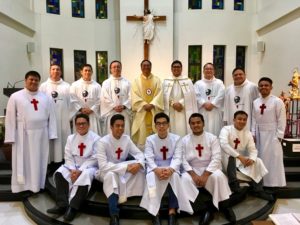 Fr. Jojo Eloja, the Provincial Superior of the Philippines, shared with those present the history (two young Camillian students, Ivo Anselmi and Pietro Ferri, arrived in Manila in 1974 to complete their studies in theology at Manila at the suggestion of Fr. Antonio Crotti who at that time was the Vice-Provincial Superior of Taiwan); the physiognomy (64 religious of about ten different nationalities: Filipinos, Italians, Taiwanese, Malaysians, Vietnamese, Pakistanis, Americans, South Koreans, Chinese); and the charismatic ministry of the Camillian religious in the Philippines. The challenges for the present and the future of the Province of the Philippines are similar to other Camillian situations in Asia: the promotion of vocations, the quality of the formation of candidates, the ongoing formation of religious, and economic sustainability and financial transparency, ensuring that works and institutions are increasingly in line with the Camillian profile and what inspires the Camillians. In Australia there are six religious involved in hospital chaplaincies and nursing homes. Service in parishes is also provided in cooperation with the diocese of Parramatta. There is also the prospect of opening a new community in another area of the vast country of Australia.
Fr. Jojo Eloja, the Provincial Superior of the Philippines, shared with those present the history (two young Camillian students, Ivo Anselmi and Pietro Ferri, arrived in Manila in 1974 to complete their studies in theology at Manila at the suggestion of Fr. Antonio Crotti who at that time was the Vice-Provincial Superior of Taiwan); the physiognomy (64 religious of about ten different nationalities: Filipinos, Italians, Taiwanese, Malaysians, Vietnamese, Pakistanis, Americans, South Koreans, Chinese); and the charismatic ministry of the Camillian religious in the Philippines. The challenges for the present and the future of the Province of the Philippines are similar to other Camillian situations in Asia: the promotion of vocations, the quality of the formation of candidates, the ongoing formation of religious, and economic sustainability and financial transparency, ensuring that works and institutions are increasingly in line with the Camillian profile and what inspires the Camillians. In Australia there are six religious involved in hospital chaplaincies and nursing homes. Service in parishes is also provided in cooperation with the diocese of Parramatta. There is also the prospect of opening a new community in another area of the vast country of Australia.
Fr. Luigi Galvani described the young history (1996 was the year of the first visit of Camillians to Indonesia) and the lively activity of the presence of Camillians in Indonesia . In 2011 the General Consulta of the Order canonically recognised the Camillian foundation in Indonesia. The promotion of vocations still emerges as a priority with the prospect of beginning a new form of Camillian presence in East Timor (with the prospect of a new house for the novitiate). It is necessary to cultivate and implement the missionary spirit of the young Camillians and to develop the quality of their skills and expertise in ministry and theology. The project to open and organise a Camillian centre for formation in Maumere is being cultivated. The dream is felt of being able to open a Camillian community in Jakarta, the political and government capital of Indonesia. Economic sustainability always constitutes an impassioned and creative challenge of divine Providence!



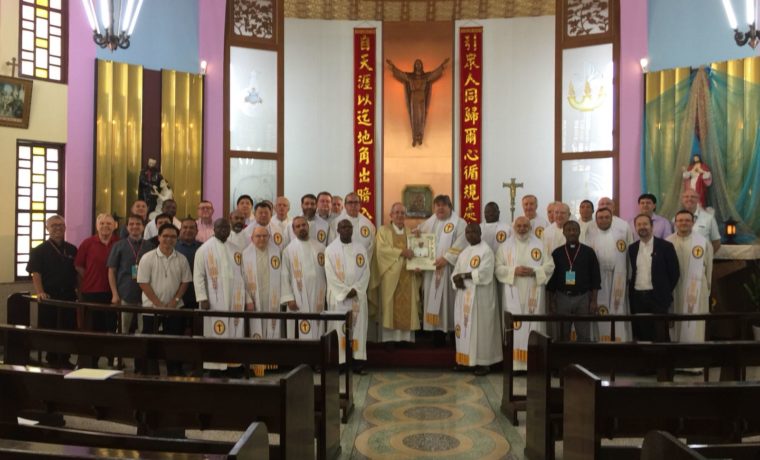
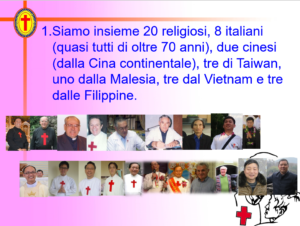
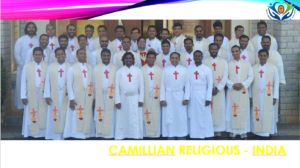
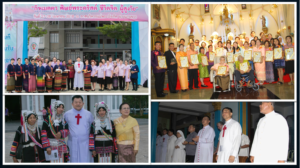
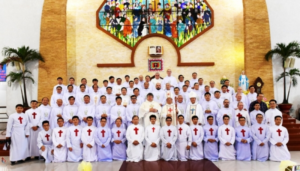
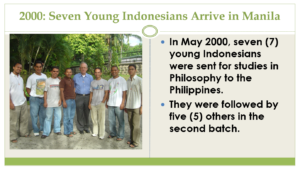











Camillians on Facebook
Camillians on Twitter
Camillians on Instagram